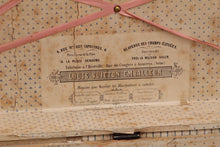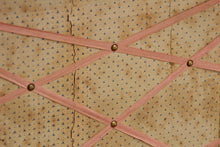
A Louis Vuitton Trianon trunk, identical to the one showcased at the Asnieres museum in Paris, stands as a testament to originality and preservation. This specific model mirrors the pristine condition of the piece displayed by Louis Vuitton. It's among the earliest trunks crafted and conceived by Louis Vuitton himself and stands distinct from subsequent Trianon models found in the market. A rare gem for true collectors.
Condition Report: Very good condition
Please refer to the photos for more details
Dimensions: 80cm x 54cm x 68cm
How it all started...
In the serene village of Anchay, a young boy named Louis Vuitton often gazed at the distant horizons, dreaming of the grand city of Paris. His aspirations weren't of grandeur but of creation. He envisioned a new era of travel, defined by a trunk unlike any other.
Leaving his hometown behind, the young Louis embarked on a two-year trek to Paris. The journey was long, but every step was fueled by ambition. Upon his arrival in the City of Lights, he apprenticed under the esteemed trunk maker, Monsieur Marechal. Here, amidst wood, leather, and tools, Louis refined his craft, innovating and adapting.
By 1854, Louis had absorbed all that he could from his apprenticeship. The streets of Paris now echoed with his reputation, and it was time to make a mark. Louis Vuitton, the brand, was born at 4 Rue Neuve des Capucines. It wasn’t just another store; it was the birthplace of the flat-topped trunk. This ingenious design allowed for easy stacking during travel, a stark departure from the conventional domed trunks.
While his contemporaries were content with the status quo, Louis sought progress. He replaced the popular leather exterior with the Trianon canvas, a game-changing material that was both light and resilient. Yet, with success came imitators. Unfazed, Louis introduced the striped Rayée canvas and then the Damier canvas, always a step ahead of the counterfeiters.
The trunks weren't merely luggage; they were personalized companions for the journey. Louis and his growing team catered to the unique requirements of their elite clientele, crafting compartments for clothes, shoes, books, and even champagne. Every trunk was a piece of art, tailored to its owner.
The late 1800s brought a new challenge: the passing of Louis Vuitton. But his legacy was far from over. Georges, his son, honored his father with the Monogram canvas in 1896. More than a design, it symbolized the journey of Louis Vuitton - from a dreamer in Anchay to a legend in Paris.
As the world around evolved, so did the trunks. The essence, however, remained unchanged - a commitment to excellence, a spirit of innovation, and a legacy of Louis Vuitton himself. The trunks journeyed across continents, sailed across oceans, and witnessed history unfold, always a silent testament to Louis Vuitton's enduring vision.
From the tranquil lanes of Anchay to the bustling boulevards of Paris, and further to the farthest corners of the earth, Louis Vuitton's trunks have come a long way, embodying the spirit of a man and his dream.





























